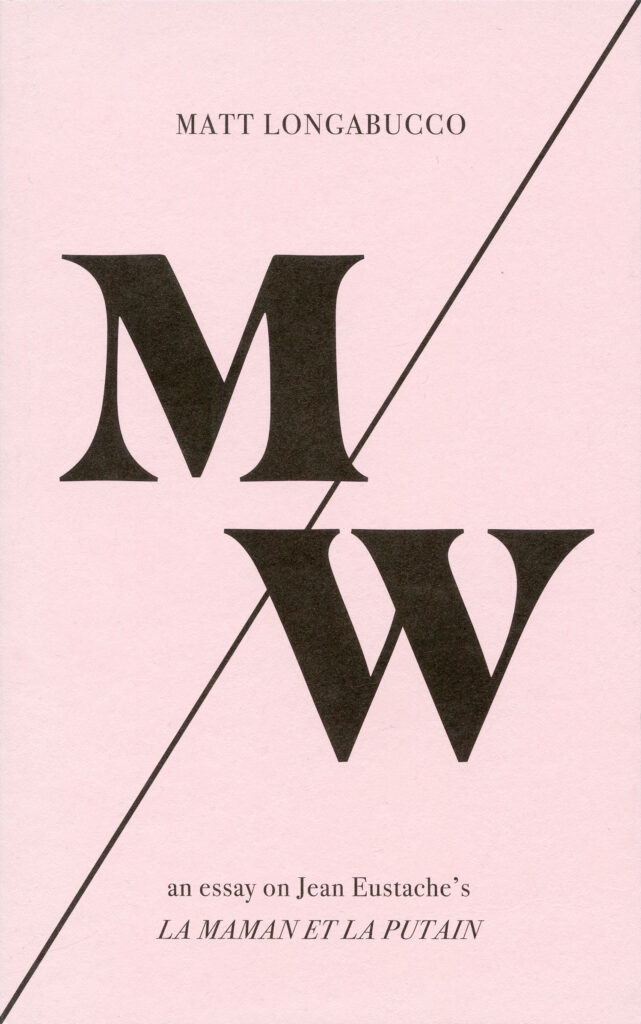More than a few of the critics and cineastes who write about The Mother and the Whore struggle to reconcile the movie’s power and allure with its “reactionary” politics and bleak view of a world in which sexual liberation has led to emptiness rather than fulfillment, and political dreams have washed back ashore to decay in the shriveling glare of individual shortcomings and social deadlock. Why retell it now? To be or not to be one of those fools Eustache wants to toy with, choking on unpalatable opinions expressed with dubious conviction? Should I decide once and for all whether this movie is a justified masterpiece to be redeemed for our age, or a relic of a sad era and a somehow inadequate creator? I am holding on, so far, to the twists and turns in the story of these people who are ambivalent about each other but also determined, as their maker said, to “try to destroy each other.” I’m ambivalent about them, too. They can’t figure out how to be together, and they fake or recall but can’t really find any lightness. I like lightness, too, I worry that it’s more necessary than we think, but I can’t often find it. Where does it disappear to? I’m aging, is that it? Or is everything about sex, the city, or the future really so grim? I suspect I’ll have to say, eventually, what a livable life might look like without this pretense to charm and romance that French movies sold us so well that we—can I say we?—hold them dearer than almost anything, which is to say we can’t imagine what our desire would look like stripped of their (chic, forever modern) garments. I’ll move, like a movie, to the next scene.

M/W: An Essay on Jean Eustache’s La maman et la putain
Matt Longabucco
May 2021
Exquisite, resonant, and spectacularly wise.
Kristin Dombek
Jean Eustache came of age as a director in the aftermath of the French New Wave, and made La maman et la putain (The Mother and the Whore) already disillusioned by the events of May ’68. Several years after the film’s 1973 release, he committed suicide. Matt Longabucco’s book-length essay reckons with Eustache’s document of political bitterness and romantic catastrophe from the standpoint of our own vexed present in which the unfulfilled legacies of the Left and the sexual revolution still haunt our hopes and darken our horizons.
About the Author
Matt Longabucco is the author of several chapbooks, including Heroic Dose (Inpatient Press). His poems and essays have appeared recently in Folder, Mirage, Brooklyn Rail, and The Poetry Project Newsletter. He teaches writing, innovative pedagogy, and critical theory at New York University and at Bard College’s Institute for Writing & Thinking. He lives in Brooklyn.
Praise
Exquisite, resonant, and spectacularly wise. M/W is a beautifully ambivalent cover of Jean Eustache’s La maman et la putain. Longabucco re-sings the whole 1973 movie, with back-up by Barthes and Proust, to the tune of a very 21st century mid-life reckoning with masculinity, collectivity, love, and other broken things. This bends time, like the aftermath of ’68 was yesterday, because “the revolution we’re trying to live is haunted by the old ones, their blind spots, their cruelties, their romance.” Longabucco is a revelatory essayist, and M/W stayed with me long after I put it down, good company in bad times.
Kristin Dombek
As thrilling as Geoff Dyer’s film-sized essay on Andrei Tarkovsky’s Stalker and Nathalie Léger’s on Barbara Loden’s Wanda—and like them, a deliriously erudite bout of screenish identification and its necessary crises.
Jonathan Lethem
The beautiful intensities of this remarkable book reflect on many mysteries—love, movie making, myths—while illuminating why stories matter to us, and shall always matter: they not only tell us who we are, but what we long to be. A wonderful achievement.
Hilton Als
In the News
Links
Publication Details
ISBN: 978-1-946433-82-4
Trade Paperback
Perfect-bound. 128 pp, 5 x 8 in
Publication Date: May 01 2021
Distribution: Asterism Books (US), Inpress Books (UK)
Series: Dossier